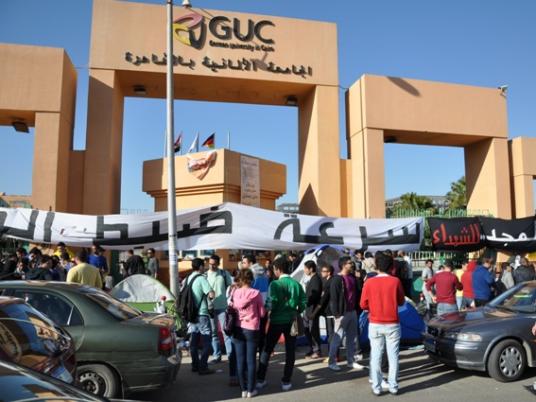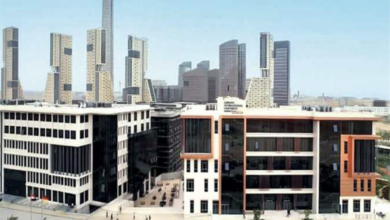
A miniature Tahrir Square has bloomed on the desert outskirts of Cairo, in front of the gates of the German University in Cairo. There lie a few tents in which blankets and pillows are chaotically unfolded, textbooks and newspapers piled over each other, a corner where students can make coffee and tea, and the entangled wires of laptop and cell phone chargers.
It’s the little piece of land they have been occupying for the past two weeks to protest the politically motivated suspension and expulsion of four of their fellow students, as well as a teaching assistant who was reinstated last week.
The GUC administration took the disciplinary action after a protest erupted on campus following the commemoration of their fellow student, Karim Khouzam, who was killed in the violence that took place at the beginning of February between fans of opposing soccer teams in Port Said.
During the protest, students demanded that the administration remove Hosni Mubarak’s name from two inauguration stones and replace them with a memorial for Khouzam. They wrote their demand on paper and placed it in the office of one of the officials upon his request.
Two days later, the four students and the TA were summoned for interrogation and were then expelled for allegedly committing violations that included storming the university building, endangering student’s lives, assembling inside the university premises and slandering Ibrahim al-Dimeery, a member of the university’s board of trustees who heads the university’s disciplinary committee and served as transportation minister under Mubarak.
“Down with military rule,” they chanted, rocking the place and echoing Tahrir Square chants while holding banners with swastikas reading “the Nazi University in Cairo,” comparing GUC to Hitler’s fascist Germany.
Since then, dozens of students have held a sit-in outside the university, raising a number of demands, including the return of the expelled students, an independent elected student union, writing their own student bylaws and putting them to a referendum.
“I am ready to die in order for me and my children not to be oppressed again in the future,” said May Farrag, her voice hoarse after a five-day hunger strike along with 11 other students. For them, their sit-in is a matter of principle.
“What is happening is not just about a student or about getting Demeery to leave. If we reached our goals, we will get the freedom that we want. We will break people above us who are shutting our mouths. Everyone has to understand that he has rights in this country. And it’s in our hands to get these rights,” added Farrag, on the sound of students singing revolutionary songs and reciting poems they’ve written. “This spirit is priceless,” she said.
The hunger strike was one of their tactical escalations to pressure the administration in addition to other actions, including the resignation of the administration-appointed student union, daily strikes by students in different departments, and filing a lawsuit against the administration’s decision to expel the students in the Administrative Judiciary Court. A judge adjourned the case to 18 March at the first trial session that took place Sunday.
Although the GUC students’ fight for the establishment of an elected student union had started last year, the huge numbers participating in the protests this time are unprecedented, especially for a private university. With the exception of the American University in Cairo, private universities in Egypt don’t have a history of student activism like public universities. They are run as for-profit investments.
“The administration is trying to weaken the student union and they want to cancel the political committee. They want to avoid any problems,” said Amr Abdel Wahab, one of the expelled students and a former member of the first elected student union that the administration subsequently dissolved. Abdel Wahab refused to be interrogated by the disciplinary committee before the latter reveals the university’s internal bylaws, which should state the disciplinary course that the university would take in similar cases, if any.
“The university has decided not to approve the establishment of any activities involving political, religious or ideological directives on campus, realizing by this the principle of the university’s neutrality,” GUC President Mahmoud Abdel Kader wrote in a message published on the university’s website on 23 February on grounds of ensuring the safety of students and providing the appropriate educational environment.
The students’ determination has attracted solidarity from other students from private and public universities, as well as public figures and presidential candidates. One of the first tents set up in the sit-in was that of students from the British University in Egypt, and of the 12 who entered a hunger strike, five were AUC students. Students from Cairo University also joined one of their protests in solidarity.
“I am here because if GUC students remained silent and passive about the injustice inflicted on them, one day it will happen to us in BUE and in AUC and other private universities, and I will have to shut up as well, and we will be suppressed for the rest of our lives,” said Omar al-Alfy, 21, engineering student at BUE.
Alfy believes that, just like the case with the 25 January revolution, there is a generational divide.
“The thing is that the administrations are not able to understand the students and they don’t even try to communicate with us to understand our demands. Their only way of communication is through making abusive decisions. All these administrations come from old generations, but we are brought up on different principles,” he said.
The 11 articles of the Law 101/1992, which organizes the establishment of private universities, are extremely broad and barely mention any details that would protect the rights of students. Where the matter is concerned, Article 8 of the law states that the Board of Trustees, after consulting with the University Council, puts down all the bylaws and internal regulations necessary for running the university.
However, Ahmed Ezzat, a lawyer at the Association for Freedom of Thought and Association who is representing the four students in court, told Egypt Independent that the court resorts to Law 49/1972, which organizes public universities, whenever the private university’s law is silent about a certain issue.
“The university violated [the law] by expelling the students, as the law enforces gradual escalation of disciplinary punishments. They can’t just expel the students without considering other actions of less intensity first, such as warning, community service hours, limited suspension, depriving them from entering the exams … etc.,” said Ezzat.
The human rights lawyer added that the punishment is not compatible with the alleged violations. In addition, the student violations that the university provided in the court differ from those of which university officials informed students.
“The problem is that private universities have been run as for-profit projects, and administrations think they are free to do whatever they want with the students. The law doesn’t set the basic standards that protect the students’ rights in both private and public universities,” added Ezzat.
In the meantime, students are not showing any signs of backing off.
“If this succeeds, it will be a great achievement and a leap in student activism in all of Egypt’s universities,” said Farrag.




